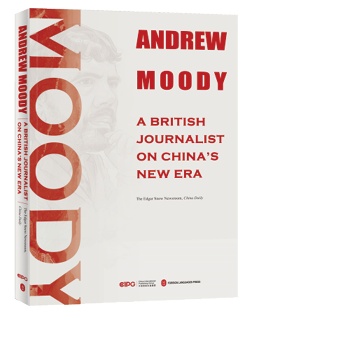
A British Journalist on China's New era
Author: Andrew Moody
Price: RMB 108
Paperback, 237 pages
Published by Foreign Languages Press
Andrew Moody, chief correspondent and senior editor with China Daily, kept the habit of writing a diary during his 13 years of working in China. As a productive journalist, Moody wrote some 700 front-page stories and penetrating analyses on China’s new era, its economy, politics, and international relations, which added up to over a million words. Sadly, for the last three years of his life, Moody suffered from amyotrophic lateral sclerosis (ALS). Despite the physical pain, he kept working until his last days.
The book A British Journalist on China’s New Era, in its six chapters, chronicles Moody’s 13-year-long journalistic odyssey. Drawing on his interviews, speeches, notes, and news reports, it revisits key topics at pivotal moments, presenting both Moody’s own insights and the perspectives of the many foreign China specialists he interviewed. Seen through the eyes of overseas experts who have studied China in depth and at the frontlines of the media, the work offers a profound interpretation of China in the new era, showing to the world a trustworthy, admirable, and appealing China.
In the opening chapter titled “Unfulfilled Dream,” Moody expresses a personal wish in his diary: writing a book on the China of the new era.
Born in West Stockwith in Nottinghamshire of England, Moody showed a penchant for academia and amassed a sizeable book collection at a young age. After having studied economics and gaining an honors degree from Coventry University, he swiftly committed his life to a career in journalism that spanned nearly four decades. Before joining China Daily, he made a name for himself in the U.K. with his work as a political reporter, business editor, and columnist with national and regional newspapers.
While working in China, Moody’s interest in understanding Chinese President Xi Jinping and his thoughts grew. In 2015, when he went to Johannesburg, South Africa, to cover the Second Summit of the Forum on China-Africa Cooperation, he described Xi as “most charismatic” in his diary after listening to his speech.
His job also offered him opportunities to travel and explore parts of China that Westerners rarely have the chance to see and to interact with people of different political persuasions, allowing him to gain a perspective of the real China and the misunderstandings of Western countries. His writing has been widely published in The Washington Post and The Wall Street Journal in the United States, The Daily Telegraph in the United Kingdom, Le Figaro in France, and many other publications around the world.
The second chapter collects some representative diaries of Moody. During his 13 years in China, he filled up 13 notebooks. For example, in his diary on September 9, 2020, he wrote: It (Shenzhen) is the only city in the world that has full 5G access and is, of course, home to telecommunications giant Huawei, and Tencent, which owns the WeChat social messaging app. Over the next decade or so, it is not inconceivable that it could become an even more significant technology hub than Silicon Valley given its strengths in artificial intelligence and digital technology, as well as China’s ambition to become a global technology leader by 2035.
In the following two chapters, more of Moody’s diaries and notes are shared with readers, which record the new era and also the relations between China and the rest of the world. For example, in his diary on September 24, 2020, he shared the opinions of other top experts, like Peter Williamson, a professor at Cambridge University’s Judge Business School, who believes that there has been a significant change in Chinese innovation. “It (China) is now at the leading edge of a range of technologies, including AI, biotechnology, quantum computing, and renewable energy,” Williamson said.
Chapter five contains excerpts from Moody’s exclusive interviews with more than 150 top China experts from around the world, with many of whom he formed deep friendships. For example, Moody interviewed Kerry Brown, director of the Lau China Institute at King’s College London, who believes China is now a global player in a way it has never been before. He also considers Xi Jinping Thought on Socialism with Chinese Characteristics for a New Era a vision of historic progress.
The last chapter puts several commemorating articles of his friends and relatives, such as his sister Jayne Graham. She recalled that Moody loved his job which challenged him but also allowed him to use his political and business knowledge to great effect; a culture that allowed him to explore many of his personal interests in art, music, and literature; a chance to travel and explore parts of China that Westerners rarely have the chance to see.
In 2019, Moody was honored with the China Friendship Award, the country’s highest award for foreign experts who have made outstanding contributions to its economic and social progress.
Zhou Shuchun, former publisher and editor-in-chief of China Daily, said that Edgar Snow’s work in China in the 1930s and ’40s produced not just the book Red Star Over China but a glowing light from the darkness of war that spoke of better days and indeed, a new era ahead. This book, dedicated to the memory of Andrew Moody, also enlightens many about China, and underlines that a modern new era is indeed afoot, something that can only be a good thing for the whole world.